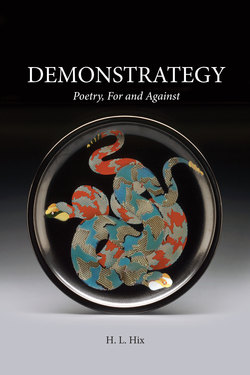Читать книгу Demonstrategy - H. L. Hix - Страница 9
На сайте Литреса книга снята с продажи.
ОглавлениеPreamble
I intend the coinage demonstrategy to break two ways, toward two pretended etymologies. As demon strategy, this book’s title derives from daimon, the ancient Greek word for a divinity, genius, attendant spirit, and strategía, Greek for generalship, decision, command. As demonstrate-gy, it derives from the prefix de- and the root monstrare, the Latin verb meaning to show.
Both derivations imply that poetry, like a magnetic field, has two poles, in poetry’s case one pole affirmative, the other oppositional.
The derivation from daimon poses the question Wittgenstein asked in this way: “Is this the sense of belief in the Devil: that not everything that comes to us as an inspiration comes from what is good?” It marks the tendency, in origin stories about poetry, to personify poetry’s affirmative pole as a benign being, a god or angel or muse, and its oppositional pole as a malign being, a devil, as when Czeslaw Milosz grants that “poetry is rightly said to be dictated by a daimonion,” but adds the disclaimer that “it’s an exaggeration to maintain that he must be an angel.” As a demon strategy, is poetry animated by a demon like the one that secured Socrates from error, or like those that gave the Gerasene to break all chains and fetters? This book’s answer to that either/or is yes, to both.
The derivation from monstrare also offers an either/or. Does poetry demonstrate in the affirmative sense, as a lab experiment might demonstrate that one element can bond with another, and as a mathematical proof might demonstrate that the square of the length of one side of a right triangle equals the sum of the squares of the lengths of the other two sides? Or does it demonstrate in the oppositional sense, as workers in a union might demonstrate against unfair employment practices, and as affected citizens might demonstrate against an unjust political decision? Again, this book’s answer to the either/or is yes, to both.
Thus the double entendre in the subtitle: that poetry itself ever urges both a for and an against, and that the book gives both a case for poetry and a case against it. That, because “for” and “against,” also, each has more than one meaning. “For” here, to mean both in favor of, as in “I’m for gun control,” and in service of, as in “the car is for getting back and forth to work.” “Against,” to mean both opposed to, as in “I’m against fracking,” and adjacent to, as in “the ladder is against the wall.”
Do the articles that follow explore poetry’s polarities, or do they expose poetry’s polarity? I hope the answer is yes.
